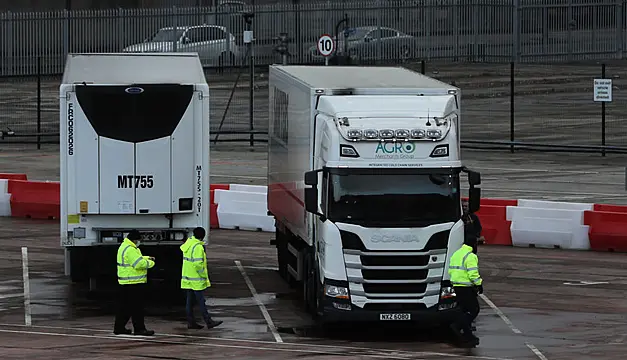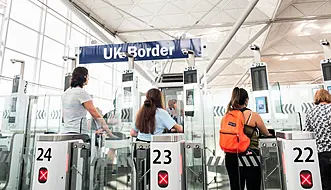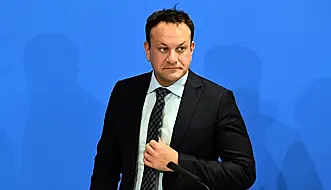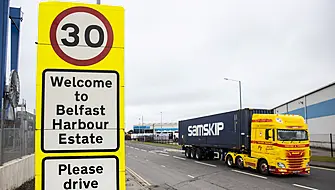A DUP minister is facing legal action for not securing the wider approval of the Stormont Executive for port checks required by the Northern Ireland Protocol.
A pre-action letter has been served on Agriculture Minister Edwin Poots, stating an intention to commence judicial review proceedings if he does not declare an intent to refer decisions on the checks and inspections to his Executive colleagues for approval.
Mr Poots and his Department of Agriculture, Environment and Rural Affairs are under a legal obligation to fulfil the commitment made by the UK government in the Brexit Withdrawal Agreement to carry out checks on goods arriving in Northern Ireland from Britain.
If the case, brought by a group called Unionist Voice Policy Studies, is successful, and Mr Poots is required to refer decisions around continuing or intensifying the checks to the Executive, it could raise the prospect of the DUP using a Stormont veto mechanism to try to thwart the moves.

That could then potentially put the administration at odds with the UK government’s legal duty to implement protocol checks.
The protocol, which was agreed by the EU and UK as a way to keep the Irish land border free-flowing post-Brexit, has created a series of new customs and regulatory barriers between Northern Ireland and Britain.
Negotiations between London and Brussels to resolve issues with the operation of the protocol are due to resume in the new year.
A series of grace periods limiting the volume of checks required under the protocol have been indefinitely extended by the UK.
The pre-action protocol letter, seen by the PA news agency, argues that, under the terms of Stormont’s Ministerial Code, Mr Poots is obliged to refer any significant or controversial decisions to the Executive for approval.
“It is trite to point out that the imposition of the protocol is highly significant and controversial,” the letter stated.
“That this is so is beyond any rational dispute.”
Mr Poots did not refer the protocol checks to the Executive for approval before the introduction of the arrangements in January this year.

Former DUP agriculture minister Gordon Lyons, who stood in for Mr Poots while he was recovering from a cancer operation, caused controversy in February when he tried to halt work on constructing permanent checking infrastructure without seeking prior approval of the Executive.
Any judicial review would face a potentially significant legal hurdle on the issue of delay, and why it has been initiated almost a year after the protocol became operational.
The applicant argues that the ministerial duty to refer a matter to the Executive is “ongoing” and contends that an issue which starts out as being benign can later become significant and controversial due to other factors.
Loyalist activist Jamie Bryson, which is the named person taking forward the case on behalf of the group, said a separate recent legal challenge related to the protocol had demonstrated that the issue passed the threshold for being considering significant or controversial.
He said the case brought by Belfast businessman Sean Napier against the DUP’s unlawful boycott of north-south political meetings, as part of its protest over the protocol, had established that the party was prepared to break the law to demonstrate its opposition to the Brexit trading arrangements.
“It is very clear that a significant and controversial issue must be brought to the Executive, and in the absence of agreement the minister is deprived of authority to act in relation to the disputed issue,” he said.
“The Napier application has made clear – via outlining the DUP’s protest which the court has declared unlawful – just how controversial and contentious the implementation of the protocol is.
“Minister Poots should therefore simply refer the matter to the Executive.
“Naturally, if he were to be blocked by the Executive, then he would in fact have no power to implement the protocol at all.”
Mr Bryson acknowledged that his move could be viewed as an attempt to “game” Stormont’s veto mechanisms to prevent protocol checks.
He said the judgment in the Napier case highlighted that the system of governance at Stormont relies on the “goodwill” of the parties involved – an area in which the court expressed a reluctance to intervene.
“Goodwill is not a legal requirement,” he added.
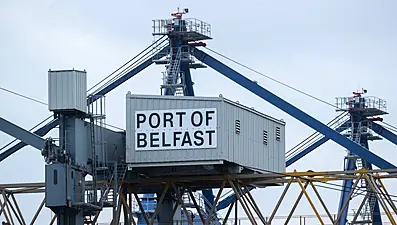
“Given the way unionism has been treated, goodwill is – or should be – in short supply. If some take the view this is an effort to game the mechanisms, then so be it.
“The ultimate objective is the dismantling of the Union-subjugating protocol, and in that regard the ends justify the means. Lawfare is better than warfare on the streets, which no-one wants to see.
The pre-action letter, which has also been sent to the Executive Office as a noticed party, has given Mr Poots 14 days to respond.
